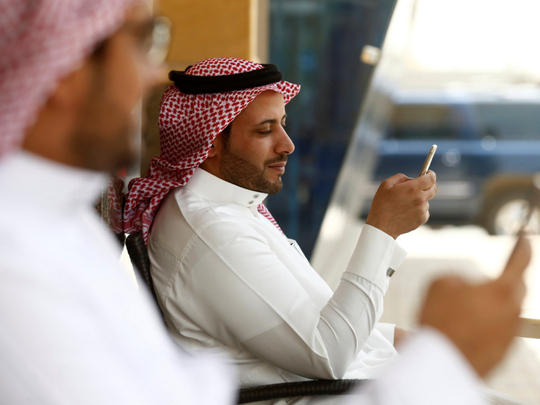
Dubai/Riyadh: The participation of tens of thousands of young Saudis in a social media debate over plans to reform the country was remarkably different from that under previous leaders.
Leaders have historically courted public opinion only via informal councils with tribal, religious and business leaders or citizens seeking to petition them.
But that is slowly changing. In one of the most active countries on social media in the Arab world, leaders have started trying to shape the online debate with carefully managed media campaigns and senior officials have been sacked after social media criticism.
“It’s a new focus for the government as it reaches out to a young Saudi population that is more likely to use social media,” Saudi analyst and commentator Mohammad Al Yahya said. “That’s the most effective way to capture their attention.” One recent showcase for this was the launch of 31-year-old Deputy Crown Prince Mohammad Bin Salman’s Vision 2030 reform plans, which used Twitter alongside traditional media to build anticipation and introduce hashtags — key discussion phrases.
“A strong and determined country with a connection between the government and the citizen,” one of the slogans read.
Some 190,000 Twitter users in Saudi Arabia actively took part in the ensuing debate over Vision 2030, generating more than 860,000 messages according to France-based social media monitor Semiocast.
This meant the discussion reached 46 per cent of the 7.4 million active Twitter users in the kingdom, Semiocast said, describing this level of outreach in a state-sponsored debate as exceptional.
There is good reason for the sensitivity: since 2012 social media storms in Saudi Arabia over government policies or the actions of senior officials have culminated in the sacking of senior people on at least five occasions.
Level of participation
The level of participation means even ministers without social media accounts invest time and money monitoring what people say about them online, said Diya Murra, a Riyadh-based account director for social media agency The Online Project.
“People are holding them accountable for things that are being done or not,” he said.
Social media use among the 21 million Saudis and roughly 10 million foreign residents of the kingdom cuts across political and religious lines: keenly followed social media users include both strict Muslim clerics and self-described liberals.
In a country in which debate has traditionally been strictly regulated by state decree and cultural tradition, and in which gender mixing is often illegal, social media has allowed many young Saudis to interact in ways that were impossible before.
Twitter is most popular among 18- to 24-year-olds in Saudi Arabia, followed closely by users in their late 20s to early 40s and its usage is split roughly between men and women, according to iMENA Digital, which serves clients in Saudi Arabia. It said photo-sharing site Instagram has become the leading channel among young Saudis, around three-quarters of them women.
Speaking at a packed discussion about Twitter in an expensive Riyadh hotel last month, Saudi Foreign Minister Adel Al Jubeir said the platform was not always an accurate barometer of public opinion, but that it could help track trends.
“It is direct. There are no barriers,” he told the largely young audience, who were segregated by gender.
However, he and other Gulf Arab politicians speaking at the forum also said they were in favour of controls.
The growing influence of social media became apparent in 2012 when the late King Abdullah Bin Abdul Aziz sacked the religious police chief and replaced him with a relative progressive after a viral video showed members of the body harassing a family in a mall.
In April 2014, as a deadly outbreak of Middle East Respiratory Syndrome (Mers) swept Jeddah, anger over a perceived cover-up surged on social media and King Abdullah sacked the health minister.
Since King Salman came to power in January 2015, such sensitivity seems to have only amplified. Another health minister, Ahmad Al Khateeb, widely regarded as a protege of the king, was dismissed after footage of him shouting at a Saudi citizen during a heated argument was captured on a smartphone.
Weeks later, Salman replaced his own head of royal protocol after he was caught on camera slapping a news cameraman covering the arrival of the Moroccan king in Riyadh.












